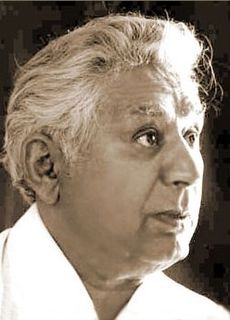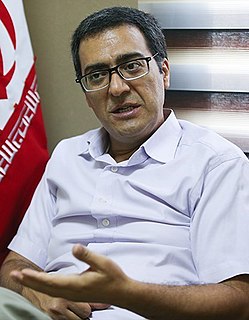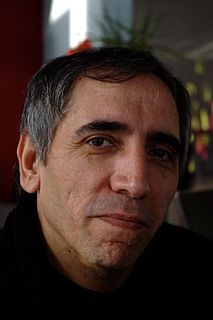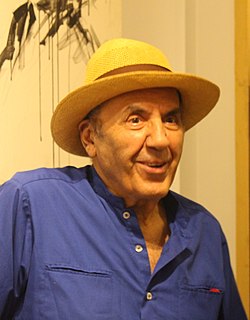 W
WSeyyed Jalāl Āl-e-Ahmad was a prominent Iranian novelist, short-story writer, translator, philosopher, socio-political critic, sociologist as well as an anthropologist who was "one of the earliest and most prominent of contemporary Iranian ethnographers". He popularized the term gharbzadegi – variously translated in English as "westernstruck", "westoxification", and "Occidentosis" –, producing a holistic ideological critique of the West "which combined strong themes of Frantz Fanon and Marx".
 W
WBozorg Alavi was an influential Iranian writer, novelist, and political intellectual. He was a founding member of the communist Tudeh Party of Iran in the 1940s and – following the 1953 coup against Premier Mohammad Mossadegh – spent the rest of his life in exile in East Germany, first during the Pahlavi regime, then returning to Germany once more following the 1979 revolution. Cheshm'hā'yash, which was published in Iran in 1952 and was subsequently banned, is considered his finest novel. Alavi was also a very close friend of Iran's famous writer Sadegh Hedayat; these two created a literary group when they were residing in Paris called "sab'e group". Although Her Eyes is considered his masterpiece, Alavi also wrote many other books, such as the novel "Chamedan" (suitcase) which was written under the influence of Freudian psychology. His other novels "Mirza", "Fifty Three Persons" and "Gilemard" are mentioned in Iranian high-school textbooks. He did return to Tehran after the revolution but did not stay too long and decided to head back to Germany. Bozorg Alavi's contribution to Iranian Literature is profound due to the modernization movement in which he was a key member.
 W
WReza Baraheni, is an Iranian, an exiled Iranian novelist, poet, critic, and political activist.
 W
WMohammadreza bayrami – is an Iranian Azerbaijani writer of Persian literature in occupation Dastan and novel. He won Badge Golden Safavid in Iran due to the promotion of Persian Language and Literature.
 W
WSādeq Chubak, was an Iranian author of short fiction, drama, and novels. His short stories are characterized by their intricacy, economy of detail, and concentration on a single theme, leading some to compare them to Persian miniature paintings. Choubak was a naturalist, and his novels reflected the dark side of society. He was a very close friend of Sadegh Hedayat who was an influential writer at that time. Many of his works are currently banned.
 W
WAhmad Dehqan, born 1966 in Karaj, a suburb of Tehran, is an Iranian author, novelist and essayist who is best known for his book Journey to Heading 270 Degrees. He has written many books about Iran-Iraq war so far.
 W
WMahmoud Dowlatabadi is an Iranian writer and actor, known for his promotion of social and artistic freedom in contemporary Iran and his realist depictions of rural life, drawn from personal experience. In 2020, he wrote and recited a work called Soldier for the Art of Peace global project, composed and arranged by Mehran Alirezaei. He has collaborated with this project.
 W
WAbolhassan Etessami, Iranian architect, calligrapher, painter, and novelist, was born in 1903 and died in 1978. His father Ebrahim Etessami was the head of finance of the Iranian province of Azerbaijan; and his brother Yussef Etessami was the founder of the Bahar journal, and the father of the poet Parvin Etessami.
 W
WPayam Feili is an Iranian poet, activist and writer.
 W
WMajid Gheisari is an Iranian writer and novelist. He was born on December 1966 in Tehran. He has won the International Eurasia Award from Russia for the premier novel in 2018.
 W
WHoushang Golshiri was an Iranian fiction writer, critic and editor. He was one of the first Iranian writers to use modern literary techniques, and is recognized as one of the most influential writers of Persian prose of the 20th century.
 W
WGhassem Hashemi Nezhad or Ghasem Hasheminejad was a Persian Literary critic, writer, journalist, screenwriter, and mysticism. Nezhad was the author of the novel ‘Elephant in the Dark’. He is a critic and author who has worked for the Ayandegan newspaper.
 W
WSadegh Hedayat was an Iranian writer, translator and intellectual. Best known for his novel The Blind Owl, he was one of the earliest Iranian writers to adopt literary modernism in their career.
 W
WMohammad-Ali Jamālzādeh Esfahani was one of the most prominent writers of Iran in the 20th century, best known for his unique style of humour. In view of his vast influence over Persian short story writing, he is often referred to as the father of this genre in Iran.
 W
WMansour Koushan (Persian: منصور کوشان) was a prominent Iranian novelist, poet, playwright, editor and director. He received the Ossietzky Award in 2010 for his outstanding work for human rights and freedom of expression. He was an active member of Iranian Writers’ Association and a strong opponent to the Iranian regime. In December 1998 Koushan was invited by the Norwegian Forum for Freedom of Expression to deliver a speech at the 50th anniversary of the U.N. Declaration of Human Rights Charter. Not long after, he received news that two of his friends and colleagues Mohammad Mokhtari and Mohammad-Ja'far Pouyandeh had been abducted and killed in Tehran. His name was likewise on the regimes death list. These killings were part of what is known as Chain Murders of Iran. Koushan was then forced to live in exile and resided in Norway the rest of his life.
 W
WAhmad E'ta, better known by his pen name Ahmad Mahmoud ; was a prominent Iranian novelist. One of his works, The Neighbors stands out as one of the most notable novels in modern Persian Literature. He was known as a distinguished social realist writer; by his works mainly concerning the lives of working class and lower class families in the urban societies of the South of Iran, especially in Khuzestan. He used to be a member of the Tudeh Party.
 W
WMohsen Makhmalbaf is an Iranian film director, writer, film editor, and producer. He has made more than 20 feature films, won some 50 awards and been a juror in more than 15 major film festivals. His award-winning films include Kandahar; his latest documentary is The Gardener and latest feature The President.
 W
WAbbas Maroufi is an Iranian novelist and journalist. His most famous novel is Symphony of the Dead.
 W
WJavad Mojabi is an Iranian poet, writer, researcher, and literary and art critic. Mojabi is one of Iran's most prominent modern writers and poets, and has published over 50 literary works in various forms. He has also written hundreds of critical works and essays on art and culture in journals and magazines. He began writing poetry in the 1960s, along with short story writing and research on modern painting in Iran.
 W
WIraj Pezeshkzad is an Iranian writer and author of the famous Persian novel Dā'i Jān Napoleon published in the early 1970s.
 W
WGholām-Hossein Sā'edi MD was a prolific Iranian writer. He published over forty books, representing his talents in the fiction genres of drama, the novel, the screenplay, and the short story in addition to the non-fiction genres of cultural criticism, travel literature and ethnography. Many consider the screenplay for Gav, Dariush Mehrjui's 1969 film, to be Sa'edi's magnum opus as it ushered in the New Wave Iranian cinema. After the 1979 revolution and his subsequent exile, he maintained an important figure in the scene of Persian literature despite the Iranian diaspora of which he unwillingly became a part. Till his death in Paris, due to depression and related alcoholism, he remained one of the most prominent and prolific of Iranian writers and intellectuals internationally.
 W
WMohammad Reza Sarshar, was born on 12 June 1953 in Kazeroun, Iran. He is an active Iranian author in the field of fiction and novels. Mr. Sarshar also worked as a radio storyteller. He has 24 years of experience in narration of popular radio program "Friday Noon story" and also editor of several radio and television programs. He is also a critic in the field of children's literature and story writing. He also translated the historical texts and has published dozens of books. Sarshar has received more than 31 national and state awards and some of his books translated in English, Urdu, Turkish and Arabic. International Journal "who is who", registered his name as one of the Iran culture's luminaries in 1994.
 W
WBahman Sholevar is an Iranian-American novelist, poet, translator, critic, psychiatrist and political activist. He began writing and translating at age 13. At ages 18 and 19 he translated William Faulkner's The Sound and the Fury and T. S. Eliot's The Waste Land into Persian, and these still are renowned as two classics of translation in modern Persian literature. In 1967, after his first novel The Night's Journey was banned in Iran, he immigrated to the United States and in 1981 he became a dual citizen of the United States and Iran. Although most of his writings in the past 42 years have been in English, published outside Iran; although The Night's Journey has never been allowed republication, though sold in thousands of unlicensed copies; and although the Persian version of his last novel, Dead Reckoning, has never been given a "publication permit" in Iran, at their latest re-appraisals some Iranian critics have named him "the most influential Persian writer of the past four decades," "one who has had the most influence on the writers of the younger generations."